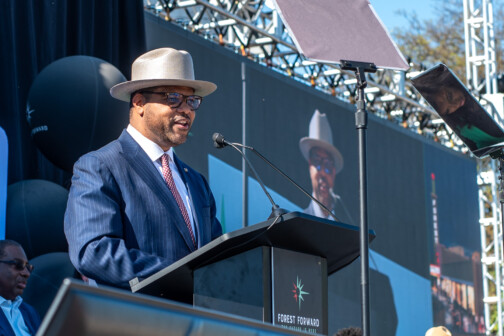Cable television companies obviously place great value on integrity. They’re willing to spend a million dollars for John Bryant’s. Prostitution, the economic mainstay of every Mexican border town, is just as illegal by statute in Juarez as in Highland Park. The difference, of course, is the ambiguous manner in which the Mexican laws are enforced. A prostitute will obviously go to jail a lot quicker for plying her trade at the corner of Preston and Mockingbird than on some dusty avenue a few hundred yards south of the Rio Grande. While pointing with sanctimonious pride to the tough-sounding statutes, Mexican officials can at the same time reap the economic benefits of providing a sort of criminal smorgasbord for the Norteamericanos. The laws do nothing to inhibit prostitution and they provide the means for punishing those who break the unwritten laws, the border town code of etiquette.
If this attitude seems hypocritical, it shouldn’t. Before looking down your nose at our Mexican neighbors, consider this: The laws that attempt to ensure ethical conduct on the part of Texas’ public officials are as much of an official joke as the laws that ban public lewdness in Tijuana. When scandals like the latest Brilab allegations against Texas House Speaker Billy Clayton surface, it’s not because a public servant has committed some extraordinary and uncharacteristic act, but because he has been nailed for the type of activity that goes on all the time.
Because this situation is the norm, it’s hard to keep from snickering at the provision in the Texas penal code that makes a person a felon if he “intentionally or knowingly offers, confers or agrees to confer on another, or solicits, accepts or agrees to accept from another . . . any pecuniary benefit for the recipient’s decision, opinion, recommendation, vote or other discretion as a public servant, party official or voter.”
If that law were obeyed, the wheels of government throughout Texas would come to a halt. It’s not that there aren’t lots of lofty ways to influence government; it’s just that the oldest method is still the most successful: reach for your checkbook. Examples of that method abound in Dallas. A cross-check of the list of large campaign contributors to Mayor Bob Folsom’s 1977 election race (his last seriously contested campaign) and the roll of members of Dallas boards and commissions shows plenty of overlap. Joe Hag-gar, appointed in 1977 to an unexpired term on the Dallas-Fort Worth Airport Board, gave the mayor’s campaign $1000. Ronnie Chamness, appointed to the City Board of Adjustment in 1977, also gave $1000. Library board member Charlotte Geary’s husband, lawyer Joseph W. Geary, gave $1000. The list goes on.
This is not to say that Bob Folsom is for sale. But it is to say that even the Dallas City Council, with a reputation as one of the cleanest public bodies in the state, honors the tradition of remembering those who are generous at election time. Appointment to city boards and commissions represents mere peanuts in the political spoils system. But the dollar-oriented ethic goes from the bottom of the system to the top. Esquire columnist Richard Reeves recently reported on the economic experiences of U.S. senators who had voted in favor of a key 1976 bill deregulating heating oil prices. Fifty-six of the senators who voted on the bill are still in office. The 31 senators who voted in favor of the deregulation have received an average of $35,000 each in campaign contributions from oil company political action committees and oil company executives. The 25 senators who opposed the measure have received an average of $3300 each in oil company funds.
Money talks. But as a number of officeholders are learning through such unpleasant experiences as Brilab, influence peddling has to conform to a few rules. Buying and selling governmental decisions is like making a pass at your next-door neighbor’s wife: It’s best to be equivocal about your intent. If you go to a U.S. senator and say “I’ll give you $35,000 if you’ll vote for my bill,” it’s bad form – and illegal. But if you give the senator $35,000 and mention later how interested you are in a particular bill, that’s just politics. The results, of course, are the same.
If that distinction seems ridiculous, think how it must seem to poor old Billy Clayton, who’s facing political death because the FBI says he committed an act that most politicians would consider only a breach of etiquette. You’re just not supposed to let a lobbyist lay a stack of cash on your desk and talk about his legislative needs at the same time.
A note of irony can be drawn from the fact that the chief legislative critic of Clayton’s close relationship with lobbyists in the past has been Pleasant Grove choirboy John Bryant. Bryant has established himself as Mr. Clean by screaming loud and long about how wrong it is for the lobby to run the legislature.
Bryant and another ultra-clean legislator, Rep. Lee Jackson, are currently paid representatives of broadcasting companies seeking the Dallas cable television franchise. Lobbyists. That means several things. For one, it means that the cable companies certainly know whose services to buy. They didn’t waste their dollars on legislators like Sen. Ike Harris, who has a reputation for waltzing cheek-to-cheek with any lobbyist who can afford the price of a dance. By purchasing the aid of Bryant and Jackson, the cable companies have bought themselves some real integrity.
Bryant’s rationale for his actions is that he “won’t be paid a penny” by Cox Cable Co. But if the company gets the franchise he will get two percent of what could be worth $200 million within five years. That raises a new concept in influence buying – deferred conflict of interest.
It should be noted that when the Dallas City Council wants something from state government, it goes to the county’s legislative representatives. Bryant and Jackson are in a position to make decisions that have tremendous impact on Dallas city government. The city council’s cable franchise decision will have great impact on Jackson and Bryant. If that’s not conflict of interest, nothing is. But it’s all legal, because it follows the unwritten rules.
If you’ve ever wondered why journalistsare so cynical, I would offer this explanation: We spend our time watching government in action.
Get our weekly recap
Brings new meaning to the phrase Sunday Funday. No spam, ever.
Related Articles

Arts & Entertainment
‘The Trouble is You Think You Have Time’: Paul Levatino on Bastards of Soul
A Q&A with the music-industry veteran and first-time feature director about his new documentary and the loss of a friend.
By Zac Crain

Local News
Mayor Eric Johnson’s Revisionist History
In February, several of the mayor's colleagues cited the fractured relationship between City Manager T.C. Broadnax and Johnson as a reason for the city's chief executive to resign. The mayor is now peddling a different narrative.

Media
Will Evans Is Now Legit
The founder of Deep Vellum gets his flowers in the New York Times. But can I quibble?
By Tim Rogers


